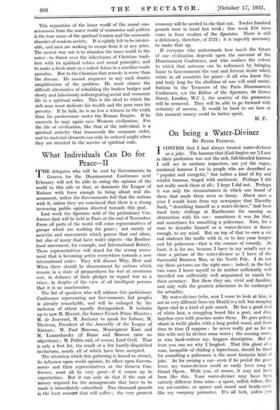What Individuals Can Do for Peace—II
THE delegates who will be sent by Governments to Geneva for the Disarmament Conference next February will not be able to swing the opinion of the world to this side or that, or dominate the League of Nations with force enough to bring about real dis- armament, unless the Governments feel that the nations wish it, unless they are convinced that there is a strong increasing public opinion directed towards this goal.
Last week the Spectator told of the preliminary Con- ference that will be held in Paris at the end of November. From all parts of the world will conic representatives of groups which are working for peace ; not merely of societies and movements which pursue that end alone, but also of many that have wider objects—the Brother- hood movement, for example, and International Rotary. These representatives will stand for the strong move- ment that is becoming active everywhere towards a new international order. They will discuss Why, How and When there should be disarmament by nations which remain in a state of preparedness for war at enormous cost, in defiance of their pledges to regard war as a crime, in despite of the view of all intelligent persons that it is an anachronism.
The list of speakers who will address this preliminary Conference representing not Governments but peoples is already remarkable, and will be enlarged by the inclusion of others equally distinguished. It includes up to now M. Herriot, the former French Prime Minister ; M. de Jouvenel, M. Jouhaux to speak for Labour, M. Titulesco, President of the Assembly of the League of Nations ; M. Paul Boncour, Monseigneur Kaas and M. Lunarcharsky (if Rome and Moscow raise no objections) ; M. Politis and, of course, Lord Cecil. That is only a first list, the result of a few hastily-dispatched invitations, nearly all of which have been accepted.
The attention which this gathering is bound to attract, its influence upon world opinion, its effect upon Govern- ments and their representatives at the Geneva Con- ference, must all be very great—if it comes up to expectations. But it can only do that if the sum of money required for the arrangements that have to be made is immediately subscribed. Two thousand pounds is the least amount that will suffice ; the very greatest economy will be needed to eke that out. Twelve hundred pounds were in hand last week ; this week £79 have come in from readers of the Spectator. There is still a deficiency, therefore, of £721 ; it is urgently necessary to make that up.
If everyone who understands how much the future of our civilization depends upon the outcome of the. Disarmament Conference, and who realizes the extent to which that outcome can be influenced by bringing home to Governments the vast and fervent deSire which exists in all countries for peace—if all who know this and truly long for the abolition of war will send contri- butions to the Treasurer of the Paris Disarmament Conference, cio the Editor of the Spectator, 99 Gower Street, London, W.C. 1, the anxiety of the promoters will be removed. They will be able to go forward with certainty of success. It would be hard to see how at this moment money could be better spent.
H. F.






































 Previous page
Previous page